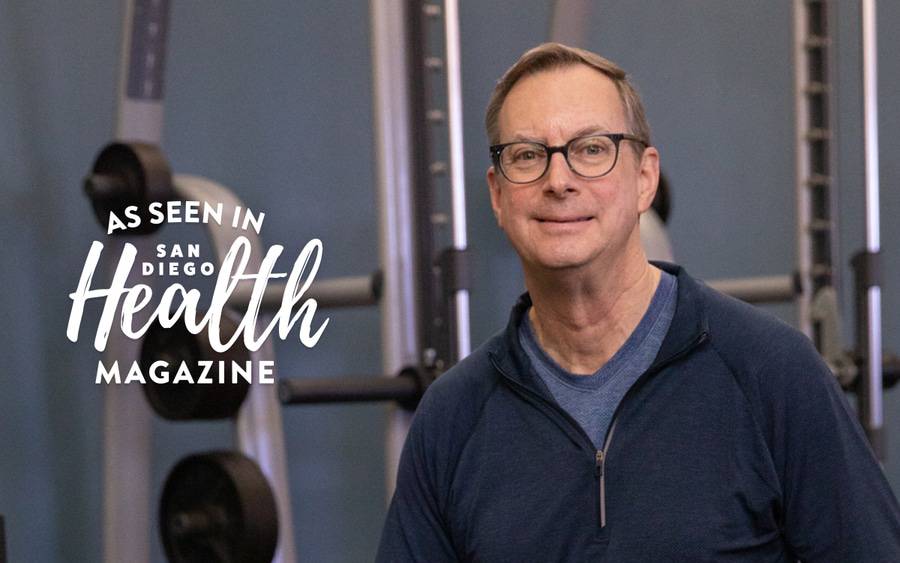New Heart Tests Save San Diego Man’s Life
Advanced technology at Scripps catches coronary artery blockage missed by standard tests

Advanced technology at Scripps catches coronary artery blockage missed by standard tests
Caring for the whole person, not just their symptoms. That’s the very definition of holistic medicine and the philosophy applied to every patient who walks through the doors of Scripps Center for Integrative Medicine in La Jolla.
A comprehensive facility that combines the best in conventional and holistic medicine, the center offers patients a full range of programs and services dedicated to treating disease and promoting health — of mind, body and spirit.
“Integrative medicine is a blending of traditional allopathic — or modern — medicine with a more Eastern philosophy and an openness to cultural beliefs and therapeutic treatment methods from all across the globe,” explains Christopher Suhar, MD, a Scripps Clinic integrative cardiologist and director of Scripps Center for Integrative Medicine.
Combining the amenities of a top-notch wellness retreat with the exceptional evidence-based medical care and technology you’ve come to expect from Scripps, the facility brings the best of all worlds of medicine to your backyard to help you achieve optimal outcomes.
Ongoing cardiac care key to heart health
An optimal outcome is exactly what Keith Kendrick needed when it came to his heart health. Kendrick was in his 30s when he discovered he had a hereditary heart condition characterized by high cholesterol. Since he was adopted at birth, Kendrick didn’t know his full family history. He did know he had to be proactive with his heart health to ensure a healthy future.
Now age 64, Kendrick has been on statin medications for three decades to keep his cholesterol in check. He has also always made sure to be under the care of a cardiologist in whatever city he lived. Since 1997 that city has been San Diego and that cardiologist has been Douglas Triffon, MD, Scripps Clinic cardiologist and medical director of the Scripps Lipid Clinic.
“Generally, because of my hereditary issue, I’ve kept a good watch on my diet,” Kendrick says. “But because I have the gene that’s not good news for cardiovascular health, I’ve made sure I see the team at the Scripps Center for Integrative Medicine. I’ve been seeing them regularly for 20 years. Once I entered my 60s, my statins were doing their job, but the team decided to run some additional tests.”
Advanced cardiac imaging detect blocked artery
Advanced cardiac imaging detect blocked artery
“The newer test, a CT coronary angiogram, picks up lesions that normal stress tests miss. The more advanced testing was lifesaving in his situation.”
Dr. Douglas Triffon, Cardiologist, Scripps ClinicAs a marketing executive for a New Zealand–based company, Kendrick was used to traveling extensively for work. When he felt tired after two round-the-world business trips, he chalked it up to jet lag. Still, being proactive and putting his faith in his integrative cardiology team, he went through a panel of tests and an echocardiogram that all came back normal. Yet, there were a few newer tests Dr. Triffon wanted to try.
“We do more advanced testing for risk factors, particularly in cases like Keith, who has the LPA gene, the most powerful and most common gene that causes heart disease,” Dr. Triffon explains. “He had a typical workup, stress test and echo, but new studies have found these tests only pick up 30% of patients with coronary disease. The newer test, a CT coronary angiogram, picks up lesions that normal stress tests miss. Keith’s CT showed severe obstructive coronary disease and a high calcium score — both of which were missed in standard testing. The more advanced testing was lifesaving in his situation.”
Kendrick then underwent an even newer test, the HeartFlow FFRct Analysis, an advanced, noninvasive test that measures blood flow to the heart. This test found an 80–90% blockage in Kendrick’s left anterior descending (LAD) artery. That’s what led to his lifesaving intervention.
Lifesaving stent placement
A mere 48 hours later, Matthew Price, MD, Scripps Clinic interventional cardiologist, performed a stent procedure, clearing the precarious blockage in Kendrick’s artery.
“Keith had a very severe narrowing in his artery,” Dr. Price explains. “I used an intravascular imaging technology called optical coherence tomography to map the inside of the artery and ensure an accurate placement of the stent. Here at Scripps, we use all types of adjunctive modalities to make sure we get perfect results. Plus, our integrated group works to make sure the handoff is seamless and there are no gaps in care between diagnosis and treatment.”
Kendrick’s results were so perfect, in fact, that five days later, he was back on a plane for another round-the-world trip, thankful for the persistence and knowledge of his medical team.
“Thank goodness I’ve been seeing Dr. Triffon for so long,” he says. “They’ve had my data for so long, they knew what I was experiencing was enough for them to be proactive and run additional tests.”
Since his stent procedure in May 2019, Kendrick has maintained his pharmaceutical treatment with statins and has continued to see Dr. Triffon and his team every four or five months. His recent tests have produced excellent results.
From cardiac rehab to cardiovascular conditioning
Key to Kendrick’s recovery has been the center’s comprehensive cardiac rehabilitation program . The 12- week, 36-session program, a gold standard in the nation, is customized to each individual and their health needs. It’s a combination of education and exercise that teaches healthy cooking and nutrition, physical fitness and lifestyle changes.
“Our cardiac rehab program has one of the highest success rates in the entire country,” says Dr. Suhar. “That’s because our approach is educational — you don’t just come in, exercise and go home. We teach you how to shop at the grocery store, how to read labels, how to cook for your health, how to manage stress and reduce risk factors. Not only do we have one of the highest completion rates in the country, but our patients come out with a better understanding of how diet, exercise and lifestyle contribute to their overall health.”
Kendrick is living proof. After the completion of his 12-week program, he enjoyed the facility so much, he began working with a personal trainer who helped him tailor a workout plan to his individual needs and lifestyle. She gave him workouts he could do while traveling for business, and when gyms closed in response to the pandemic, the two continued their weekly workouts via Zoom.
“It continues to go very well and helps me keep up the balance of weights with cardio,” he says. “COVID-19 converted the treadmill and elliptical machines to local trails, and I have found my Apple Watch and Apple Fitness+ program very useful in tracking my progress.”
An innovative, integrative approach to heart care
An innovative, integrative approach to heart care
"If you’re in your 60s and you aren’t seeing a medical professional for your heart health, you owe it to yourself to see the team at Scripps."
Keith KendrickFor Kendrick, it’s the full circle of care he’s come to expect from Scripps.
“My overall health appears to be good and I feel great,” he says. “I was fortunate that by having my annual visits with the integrative medicine team and their very thorough tracking and analysis, my blockage was suspected and, with advanced technology, confirmed and treated.”
Kendrick adds a reminder to anyone in his age group, encouraging them to be proactive about their own heart health: “If you’re in your 60s and you aren’t seeing a medical professional for your heart health, you owe it to yourself to see the team at Scripps. The advancements they have, the technology and leading-edge research, the board-certified physicians — the whole team is behind you. It’s their passion and they’re at the top of their game.”

This content appeared in San Diego Health, a publication in partnership between Scripps and San Diego Magazine that celebrates the healthy spirit of San Diego.